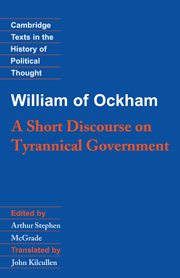Book contents
- Frontmatter
- Contents
- Preface
- A note on reference
- Abbreviations
- Introduction
- Principal dates in Ockham's life
- Suggestions for further reading
- A Short Discourse on the Tyrannical Government
- Prologue
- Book I
- Book II
- Book III
- Book IV
- Book V
- Book VI
- Appendix: text and translation
- Chapters
- Bibliography
- General index
- Index of persons
- Index of references to the Bible
- Index of references to canon law
- Index of references to civil law
- Cambridge Texts in the History of Political Thought
Preface
Published online by Cambridge University Press: 05 June 2012
- Frontmatter
- Contents
- Preface
- A note on reference
- Abbreviations
- Introduction
- Principal dates in Ockham's life
- Suggestions for further reading
- A Short Discourse on the Tyrannical Government
- Prologue
- Book I
- Book II
- Book III
- Book IV
- Book V
- Book VI
- Appendix: text and translation
- Chapters
- Bibliography
- General index
- Index of persons
- Index of references to the Bible
- Index of references to canon law
- Index of references to civil law
- Cambridge Texts in the History of Political Thought
Summary
The following translation is made with the publisher's permission from the Latin text established by Richard Scholz in his Wilhelm von Ockham als politischer Denker und sein Breviloquium de principatu tyrannico (Stuttgart: Anton Hiersemann, 1944, 1952). Departures from this text are noted in the Appendix. The aim has been to produce a version faithful in meaning and style, as far as possible in plain modern English. For an explanation of the principles employed in pursuing this aim and for notes on some difficult expressions and passages, see the Appendix.
The present volume, along with its companion volume, William of Ockham, Selections from the Major Political Works, is, to our knowledge, the first publication in any modern language of more than a few of the thousands of pages on questions of spiritual and secular power written by one of the major theologians and philosophers of the later middle ages. In contrast with most of the texts translated in the Selections volume, the Breviloquium or Short Discourse is overtly highly polemical. There is accordingly some risk of underestimating the extent to which Ockham built his argument on theological and legal principles which were commonly accepted when he wrote. Many of the notes in the present volume are meant to address this difficulty. Since Ockham is arguing against a pope or, as he thought, a pseudo-pope, his citations of canon law especially need documenting, and these must often be supplemented by consulting the “ordinary gloss,” the standard commentary found in the margins of medieval and early modern editions of the law texts.
- Type
- Chapter
- Information
- Publisher: Cambridge University PressPrint publication year: 1992



